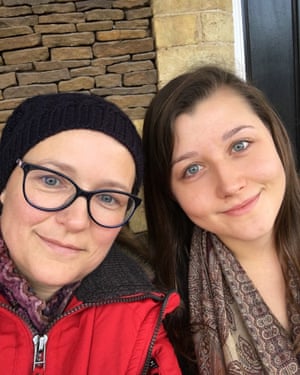Uncategorized
When survival is a recognition contest: the heartbreak of crowdfunding healthcare | Life and magnificence
Heather Bellamy’s March appointment on the Queen Elizabeth hospital in King’s Lynn didn’t go nicely. She had been recognized with acute myeloid leukemia 5 years earlier than, in December 2014; now, her physician defined gently, she had run out of choices on the NHS. Bellamy, 48, could be beginning a chemotherapy drug known as azacitidine that would prolong her life expectancy from two months to 6. Her physician requested if she had a bucket listing. “I felt crushed,” she remembers.
Talking one month on, Bellamy – a senior apply nurse and a mom of 4 from Downham Market in Norfolk – isn’t chasing her goals of bungee leaping or swimming with dolphins. As a substitute, she is fundraising on-line for an experimental most cancers drug, enasidenib, which has been authorized by the US authorities however just isn’t out there on the NHS.
To this point, a GoFundMe web page arrange by her niece has raised greater than £36,000 – a substantial sum, however not sufficient. The enasidenib therapy prices practically $25,000 (£19,600) a month; if Bellamy is to make it to the US, she might want to increase at the very least £250,000. Crowdfunding could also be her final probability.
Within the US, it is not uncommon for individuals with out medical health insurance to attempt to cowl their medical payments on GoFundMe and different platforms by publicising their story and the quantity they hope to lift. It’s much less prevalent in Britain due to the availability of common healthcare, however the BBC says crowdfunding has raised £20m for sufferers within the UK prior to now yr. Figures revealed by the British Medical Journal present that at the very least £8m has been raised within the UK since 2009 for most cancers therapy with an alternate well being aspect alone.

A marketing campaign in 2014 for Mike Brandon, a most cancers affected person in Bristol, raised greater than £450,000 for experimental remedy within the US and was extensively hailed as a hit when Brandon returned to the UK “cancer-free”. (As of 2017, Brandon was in full remission and had even returned to work.)
In 2017, practically £1.4m was raised by the household of Charlie Gard, a boy born in August 2016 with a uncommon genetic dysfunction, whose case dominated headlines for months. However for each #charliesarmy there are numerous extra on-line causes that don’t come near their targets.
Profitable crowdfunding campaigns are inclined to observe a system. They’re written on behalf of a clearly deserving beneficiary (moms, kids and sole breadwinners are on the high of the hierarchy) who has most cancers or a genetic situation – something debilitating, pressing and never their fault. Appeals are made within the language of battle: the sick battle valiantly, they’re heroic in battle, they’re courageous.
After we cut back complicated medical circumstances to on-line recognition contests, there are winners and losers, says Nora Kenworthy, an assistant professor on the College of Washington Bothell’s College of Nursing and Well being Research close to Seattle. “It’s a bit Dickensian – there are the struggling plenty and the one heroic, completely good one who will get funding and will get plucked out of poverty. Crowdfunding is popularising a brand new kind of financial market, the place persons are basically advertising and marketing themselves … it’s normalising the concept, at the very least within the US, that, with a view to get important well being providers, it’s good to compete with all these different individuals to be probably the most deserving, probably the most needy, probably the most compelling.”
It’s definitely the case that crowdfunding can be utilized to get round shortfalls or sluggishness within the healthcare system. Eli Hill, a 19-year-old scholar in Southampton, is trans and is fundraising on GoFundMe for high surgical procedure. Hill has been saving, however his wage as a part-time care assistant gained’t cowl the estimated £4,000 value. He says the three-year look ahead to surgical procedure on the NHS just isn’t an possibility. “I put on a binder day-after-day, which isn’t good for my bodily well being, because it’s proscribing my respiration and my ribs. It’s not good for my psychological well being, both, which I already battle with … Having a physique I simply fully hate is basically detrimental.”
However going public together with his trigger has include its personal challenges. Hill says there was some backlash from Twitter customers who stated he shouldn’t be asking for donations whereas paying for brand new tattoos. “It’s scary, since you’re placing your self on the market and also you by no means know what persons are going to say. And having to make your self susceptible actually sucks. It’s like: why ought to I’ve to inform everybody my trauma?” In 5 months, Hill has raised solely £205 of his £4,000 objective.
A lot of the time, crowdfunding doesn’t work: Kenworthy’s analysis (together with her collaborator Lauren Berliner) exhibits that fewer than 10% of pages attain their monetary targets. The individuals behind them are usually extremely literate, tech savvy and nicely related in PR or media. “The profitable campaigns contain an incredible quantity of labour to arrange and hold the momentum going,” says Kenworthy. “It looks as if this factor the place you simply write a narrative, take a selfie, put up it on-line and get a bunch of donations, however that’s very misrepresentative of the sort of labour and experience that goes into these profitable campaigns.”
Abdurzak Hadi, 40, is adamant that, for most individuals, crowdfunding is a waste of time. The London taxi driver arrange a GoFundMe web page for his son Mohamed to bear experimental remedy for leukemia within the US, however he raised solely £18,460 of his £540,000 goal. Mohamed died in February, aged 12. “If you do crowdfunding, it’s not like it can promote itself,” Hadi says. “You must have a crew behind it. I don’t suppose it helps by any means.”
He had spent hours updating the web page, promoted it on the radio station LBC and the web site Enterprise Insider, and even paid for Fb promoting, however most donations got here from Hadi’s household, associates and colleagues, who would have given anyway. Watching the web page into which he had poured his power and private heartbreak fail to maneuver the general public was profoundly dispiriting, he says. “I felt like individuals have been inhumane. You set in all this effort and never lots of people donate.”

Even profitable crowdfunding can go away individuals open to exploitation by unscrupulous operators. Regulatory our bodies such because the Nationwide Institute for Well being and Care Excellence make sure that solely evidence-based drugs is on the market on the NHS; via crowdfunding, sufferers can circumvent these gatekeepers with untested and typically harmful therapies, typically supplied overseas, that they could have researched themselves.
“You see people who find themselves very sick and really determined … who’re attempting to look past the solutions which might be being given to them by evidence-based drugs,” says Prof Jeremy Snyder, an professional in crowdfunding at Simon Fraser College close to Vancouver. “Individuals are basically attempting to earn a living off them and their desperation.” Snyder not too long ago co-authored a paper within the journal Lancet Oncology on most cancers sufferers’ crowdfunding for homeopathy and different different remedies. In a 3rd of circumstances, the sufferers had been instructed their most cancers was terminal, however they needed to maintain attempting choices nonetheless. “From an ethics perspective, what’s regarding is that you just’re basically throwing away different individuals’s cash.”
Sufferers typically waste not solely funds on remedies that won’t work, but in addition one thing extra treasured: time. “In quite a lot of these circumstances, individuals might have benefited from palliative care, ache administration and extra time with their household,” says Snyder.
The household of Gemma Nuttall, who had breast most cancers, spent hundreds of kilos on ozone therapy and vitamin infusions at a German clinic, raised via crowdfunding, loans and a home sale. Nuttall’s household declare they paid for six rounds of therapy at £60,000 a pop, but it surely didn’t work – she died in October 2018. Talking not too long ago to the BBC, Nuttall’s mom, Helen Sproates, questioned the choice to pursue the exhausting and costly therapy. “I do suppose to myself: ought to we have now performed the bucket listing, spent the previous couple of months of Gemma’s life together with her daughter, attempting to be blissful and make recollections?”
Her remark exposes the faultline on the coronary heart of the crowdfunding debate. Healthcare is a human proper and nobody ought to have to lift cash for their very own survival. However when somebody’s odds are incalculably bleak, you may’t blame them for pursuing each possibility, irrespective of how fraught or how slim the possibility of success.
With enasidenib already authorized within the US, Bellamy just isn’t pinning her hopes on a pie-in-the-sky answer, and researching new remedies makes her looks like her previous self. “Once I’m searching for the up-to-date analysis and solutions and issues like that, that’s after I’m the nurse.” She turns into emotional solely as soon as throughout our dialog, when she talks in regards to the prospect of not being round to attend her niece’s marriage ceremony.
There may be consolation in crowdfunding bringing individuals collectively, too. On the day we converse, Bellamy is attending a car-boot sale organised in her honour, with the proceeds going in the direction of her therapy prices; her sister and brother-in-law have taken assortment buckets all the way down to a neighborhood Tesco. “It’s not simply in regards to the cash,” she says. “I imply, sure, the cash is necessary. However that optimistic feeling actually comes from realizing all these persons are working so onerous to get me the therapy I have to hold me alive.”
